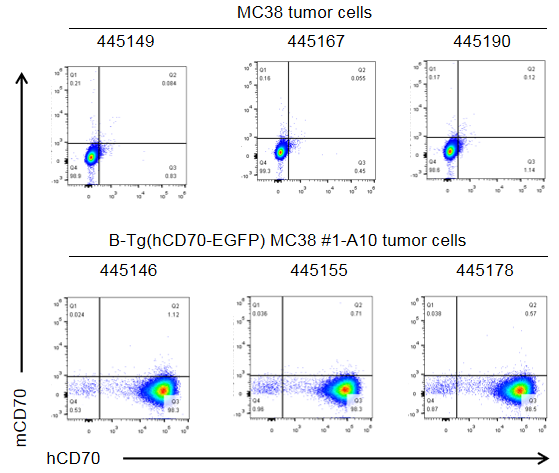B-Tg(hCD70-EGFP) MC38
|
Common name |
B-Tg(hCD70-EGFP) MC38 | Catalog number | 322364 |
| Aliases |
CD27-L, CD27L, CD27LG, LPFS3, TNFSF7, TNLG8A
|
Disease | Colon carcinoma |
|
Organism |
Mouse |
Strain | C57BL/6 |
| Tissue types | Colon | Tissue | Colon |

CD70 expression analysis in B-Tg(hCD70-EGFP) MC38 cells by flow cytometry. Single cell suspensions from wild-type MC38 and B-Tg(hCD70-EGFP) MC38 #1-A10 cultures were stained with species-specific anti-CD70 antibody. Human CD70 was detected on the surface of B-Tg(hCD70-EGFP) MC38 cells but not wild-type MC38 cells.
Tumor growth curve & body weight changes

Subcutaneous tumor growth of B-Tg(hCD70-EGFP) MC38 cells. B-Tg(hCD70-EGFP) MC38 cells (5x105) and wild-type MC38 cells (5x105) were subcutaneously implanted into B-hCD3EDG/hCD70 mice (male, 10-week-old, n=6). Tumor volume and body weight were measured twice a week. (A) Average tumor volume. (B) Body weight. Volume was expressed in mm3 using the formula: V=0.5 X long diameter X short diameter2. Results indicate that B-Tg(hCD70-EGFP) MC38 cells were able to establish tumors in vivo and can be used for efficacy studies. Values are expressed as mean ± SEM.

CD70 expression evaluated on B-Tg(hCD70-EGFP) MC38 tumor cells by flow cytometry. B-Tg(hCD70-EGFP) MC38 cells were subcutaneously transplanted into B-hCD3EDG/hCD70 mice (n=6). Upon conclusion of the experiment, tumor cells were harvested and assessed for human CD70 expression by flow cytometry. As shown, human CD70 was highly expressed on the surface of tumor cells. Therefore, B-Tg(hCD70-EGFP) MC38 cells can be used for in vivo efficacy studies evaluating novel CD70 therapeutics.












 京公网安备:
京公网安备: